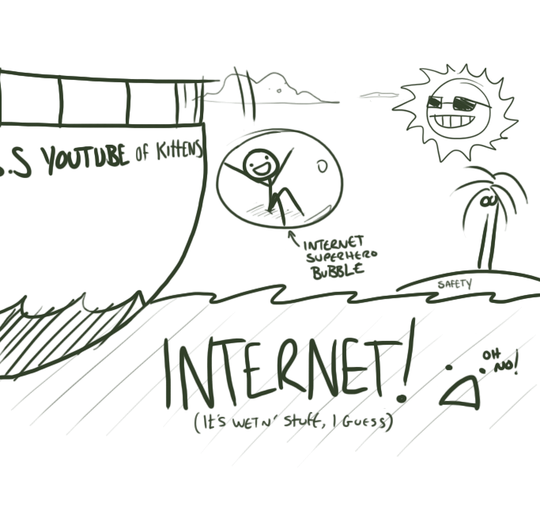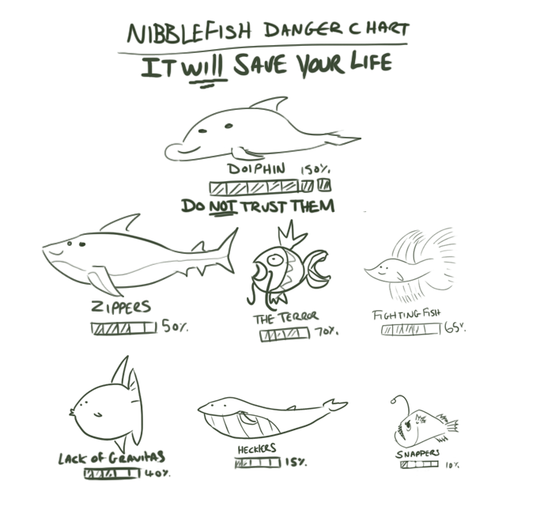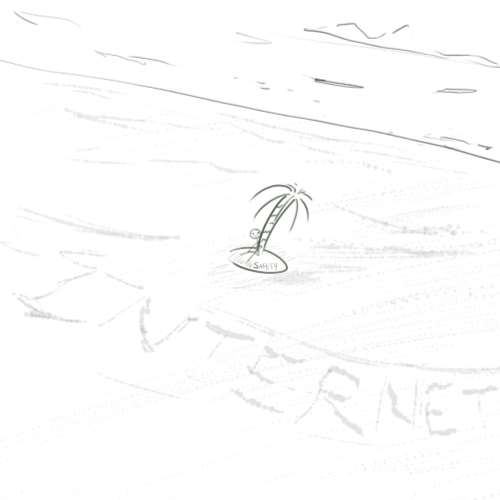To answer "why Internet is unsecure?", we actually need to understand "How Internet works?". And taking it one step further, let's ask "What is Internet?".
What is Internet?
A junior grade text book will define Internet as network of networks, and that remains true to a CTO level. In practical terms, start thinking from the fact how are you reading this text. You are reading this from either your personal computer/laptop or from an office desktop. If it is a personal computer, you are connected by dialing to the ISP, or if you are on LAN, someone else has done that step for you. A LAN itself is a network, though smaller. A LAN will have computers and routers (may be servers).
When LAN gets connected to ISP, to which more PCs, Servers, routers and LANs are connected, it becomes part of a larger network. When these larger network gets further connected, we end in having a huge network, called Internet.
How does the Internet work?
Again let's go back to the basics. How can any two computers talk? They send packets of information to each other, which are provided in a well defined protocol, which both systems understand. Think of it as one person sending a letter to another, letter is the packet, and protocol is some simple rules that will make sure that information is conveyed properly.
For example, I am writing in English and you understand what it means. Now if the second person is far away such that person one cannot deliver the letter himself, he will need to trust mediators. You may use the post office or a courier service. Now if the place is far away, one post office will send the letter to second, which will pass it further till it reaches the destination.
The same analogy works for Internet. When you are sending or fetching information on the Internet, it has to pass through many routers and servers.
Why is Internet unsafe?
Is the information in your letter safe when you post it? Yes, but only till a point when a post office worker, or someone on the way opens it. Same is true for Internet.
As the information is passing through so many routers and servers, or data is actually residing on some server, anyone who can gain access can fetch that information. Of course there are safety measures, protocols (SSH/ https) and encryption are commonly used. But any algorithm that can secure the information, will also have a counter-algorithm, that will enable to gain access.
So simply putting it, your data is hundred percent safe till you are on an isolated system, the moment you get connected to a network, someone can access the data (exaggerated? Yes). It will come down to the smartness to person who is trying to save the information vs the person who is trying to access the information
 Imagine the internet is the ocean. It is pretty big and imposing and full of weird and wonderful creatures that may or may not want to eat you alive. Fortunately for you, you've been taught from a young age that wherever you go there's going to be a few creatures out there that can't wait to nibble on your innards, but that they're like 30 feet long and such a rare sight you will probably win the lottery 3 times in a row before you get bit by one, and that you shouldn't worry too much about them. What they didn't teach you in school is that these nibblers are literally everywhere and come in various sizes.
Imagine the internet is the ocean. It is pretty big and imposing and full of weird and wonderful creatures that may or may not want to eat you alive. Fortunately for you, you've been taught from a young age that wherever you go there's going to be a few creatures out there that can't wait to nibble on your innards, but that they're like 30 feet long and such a rare sight you will probably win the lottery 3 times in a row before you get bit by one, and that you shouldn't worry too much about them. What they didn't teach you in school is that these nibblers are literally everywhere and come in various sizes. 

17Because trusting it would be like leaving your car, full of valuable stuff, unlocked in a seedier neighborhood of New York. – Daniel R Hicks – 2012-07-11T11:44:03.440
1You should probably think in terms of all networks being "Untrusted" meaning that any network can contain a compromized computer that might attack yours. A truly "Trusted" network would be rare, but "Trusted" is really just shorthand for a "More Trusted" network which you can consider just about anything behind a firewall without public access. – Bill K – 2012-07-11T16:12:50.333
1(I forgot to mention leaving the keys in the car.) – Daniel R Hicks – 2012-07-11T16:54:30.843
19Have you seen the Internet? ;) – Steven Noto – 2012-07-11T18:20:42.863
2'untrusted' means 'not trusted'. It's different from 'distrusted', which means you specifically suspect it. Example: "you shouldn't trust everyone you meet" is good advice, whereas "you should distrust everyone you meet" has a different meaning, or "I don't know either way whether Bob's statement is accurate" vs "I think Bob is lying". – barrycarter – 2012-07-12T16:32:38.930